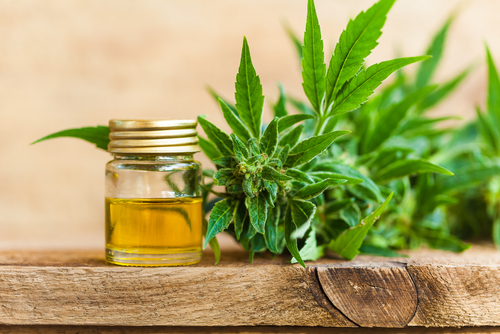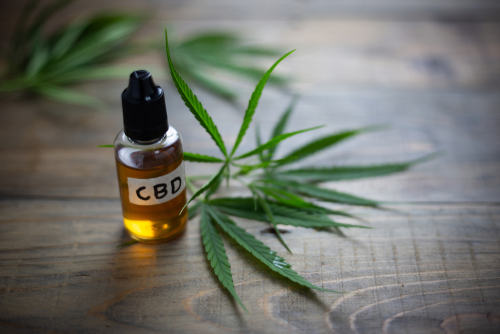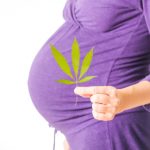Many people assume that because cannabidiol (CBD) does not cause an intoxicating “high” that it is safe to use during pregnancy.
While this sounds great in theory, it may not be entirely true.
Here’s why—no one knows whether or not CBD is safe to consume during pregnancy.
CBD is a cannabis-derived compound that has recently been approved by the Food and Drug Administration for the treatment of severe and intractable forms of epilepsy.
The molecule is also sold online as a dietary supplement for the relief of stress, anxiety, nausea, and other ailments.
Yet, regardless of what you read on health blogs and from supplement companies, no one knows for sure what impact CBD may have on a developing baby, be it positive, negative, or neutral.
To give some framework to the CBD and pregnancy discussion, let’s use caffeine as an example. Would you use caffeine pills during pregnancy? Probably not. The same likely goes for CBD oil, pending scientific data on the subject.
The Caffeine Example
Over the decades, caffeine has come under fire for producing both positive and negative effects on the human body. Overall, however, the natural compound is generally recognized as safe and is the single most commonly used psychoactive substance in the world.
During pregnancy, however, enjoying your usual hot cup of Joe is a big no-no.
In general, the research on caffeine and pregnancy is contradictory. Some research says that too much of the energizing compound may contribute to low birth weight and may increase your likelihood of having a miscarriage.
Other studies suggest that the compound may make children more likely to have ADHD later on in life.
With these risks, the March of Dimes recommends that expectant mothers reduce their caffeine consumption to no more than 200 milligrams per day, which is about one 12 ounce cup of brewed coffee.
Interestingly, prenatal cannabis consumption during pregnancy has been inconclusively linked to some of the same potential problems.
For example, some research suggests that children who were exposed to cannabis in the womb may be more likely to be impulsive, inattentive, have lower performance in school, and may be at a greater risk of low birth weight.
Also similarly to caffeine, many of the studies on prenatal cannabis consumption appear to contradict one another.
Two of the largest studies on parental cannabis consumption found no correlation between the herb and low birth weight. In fact, contrary to other research on the topic, prenatal cannabis consumption was associated with an increased birth weight in these studies.
However, one of the studies, the Ottawa Prenatal Prospective Study, found that smoking five or more joints per week while pregnant resulted in lower memory and verbal performance in children at the age of four.
Is CBD Oil Safe During Pregnancy?
CBD oil is more popular than ever. With potent anti-nausea effects and stress relieving properties, there are many reasons why the supplement seems like a miracle worker for some of the more debilitating symptoms of pregnancy.
Unfortunately, there have been no studies that examine the impacts of consuming CBD alone during pregnancy.
Most of the research on the topic centers around THC-rich cannabis, which is what has been the major concern for the past several decades.
Now that CBD is more popular, however, it’s no surprise that more women are interested in learning more about how the cannabis product may impact their baby.
Expectant mothers, however, be warned. Virtually no research has been conducted on whether or not CBD is safe to consume during pregnancy.
One of the few recent rodent studies on the topic was published in 2017 in the journal Neuropsychopharmacology.
The study provided some of the first early evidence that CBD may be helpful as a prenatal medicine. Yet, experiments in rodents are a far cry from trials with human beings. We are, after all, an entirely different species.
Still, the study found that treating mother rats with CBD reduced the chances that rodent offspring would develop memory and behavior problems after exposure to infection in the womb.
In another rodent study published in the Brazillian Journal of Medical and Biological Research, the CBD compound successfully reduced symptoms in rat babies with a very severe birth defect called Gastroschisis.
Gastroschisis is a severe condition which causes the intestinal tract to develop outside of an infant’s body. CBD is by no means a cure or prevention for this condition.
This experimental model, however, found that treating mother rats with CBD before they gave birth successfully reduced inflammation and had an overall beneficial effect on the intestinal tract in these infants, potentially improving outcomes for health and survival.
These brief rodent samples provide the first inklings of evidence that CBD may one day prove useful in maternal medicine.
Yet, apart from these few bread crumbs, the impact the of the compound on a healthy developing baby remain a mystery.
There are a few reasons, however, why many medical professionals are wary about taking CBD when you’re expecting.
The Endocannabinoid System and Pregnancy

Aside from the lack of research on the topic, there are many reasons why medical professionals are concerned about expecting mothers who choose to use CBD oil.
As it turns out, CBD alters a neurotransmitter system in the body that is essential for neurological development in a fetus.
That neurotransmitter system is called the endocannabinoid system (ECS). Named after the active compounds in the cannabis plant, the ECS is a network of communication molecules that coordinate messages from the body to the brain.
Sometimes described as the “bridge between the body and mind” cannabinoid signaling molecules allow both the brain and body to respond to changes in the environment.
As it turns out, levels of endocannabinoids fluctuate at certain times during pregnancy. For example, during early pregnancy, blood levels of the endocannabinoid anandamide drop.
More commonly known as “the bliss molecule”, anandamide is the compound that psychoactive THC replaces in the body. If levels of this “bliss molecule” are too high during early pregnancy, there is some early evidence that this may increase the chance of miscarriage.
Early experiments using cells cultured in a laboratory setting also suggest that increased levels of anandamide during some phases of the pregnancy cycle may hinder the growth of the fetus.
Medical professionals and scientists are concerned about the impact of CBD on pregnancy because the cannabis compound can artificially increase levels of anandamide in the blood.
Whether or not the cannabis compound can boost anandamide levels enough to cause meaningful changes during pregnancy is unknown. However, early evidence suggests that it is possible that CBD may have an impact on child development.
Yet, while researchers know that the cannabis compound can cause changes to this system, it is unclear what long and short-term impacts these changes may have on a developing baby.
In animal tests, cannabinoids seemed to cause behavior changes in baby rodents similar to changes that are traditionally seen when mothers experience chronic stress during pregnancy.
Of course, all of this data is experimental in nature. Right now, there is not enough evidence to decide with any certainty whether or not CBD is harmful to a developing baby.
Can I Use CBD Oil While Breastfeeding?

It may sound odd, but cannabis and breastmilk have something in common.
Both the cannabis plant and breast milk contain similar molecules. The cannabis plant contains psychoactive THC, which is the plant version of anandamide, “the bliss molecule” mentioned earlier.
Breast milk actually contains endocannabinoids like anandamide. Human endocannabinoids are abundant in breast milk, and research suggests that there is a good reason for this.
In rodent tests, endocannabinoids were thought to stimulate suckling responses in newborn babies.
Suckling is a vital response, since being able to properly nurse is what allows babies to eat efficiently and grow. So, in a way, babies are drinking human-made cannabis as they slurp up breastmilk.
If a mother consumes THC or CBD, there is a high likelihood that these molecules are also passed along in breast milk.
In fact, a report from the American Chemical Society states that approximately 1.5 nanograms of THC consumed by a mother is passed along to the baby per milliliter of breastmilk.
Yet, when it comes to CBD, research on the topic is few and far between.
According to the ACS, it is likely that CBD can be found in breast milk, but researchers lack efficient ways to measure exactly how much of the compound will be passed along to the baby in actuality.
If CBD is passed to a developing baby through breastmilk, the side effects of this transmission are unknown.
There is simply no way to tell at the present moment whether or not consuming CBD oil or other cannabis products while breastfeeding has an impact on a growing baby.
Perhaps one day, it is possible that CBD and other cannabis medicines may be explored as potential medicines for infants who have trouble eating and suckling. If human research on this topic were to exist, however, we would be living in a very different and distant future.
Reducing Risks During Pregnancy

Women face an undue amount of pressure to behave in certain ways and meet social expectations during pregnancy. All of this pressure tends to overlook one key fact, however: pregnancy is as hard as all get out.
Perhaps one of the most amazing feats of the human body, pregnancy inspires a host of substantial physical changes in the body. Severe nausea, pain, fatigue, and mood changes are among the most common changes experienced by expectant mothers.
While symptoms like these may sound trite, the fatigue experienced during pregnancy can make it difficult to walk up a flight of stairs and mood symptoms can trigger severe depression in some women.
Given these challenges, it’s not surprising that women all over the world seek remedies that can ease their pain.
Try Other Aids First
If you’re considering CBD, always consult with a medical professional or a care team about your symptoms.
A physician will know which remedies have a proven track record to be helpful in your situation and may be able to give you lifestyle recommendations to better help you adjust with the rapid changes that occur during pregnancy.
Don’t Smoke
If there is any single major takeaway from this article, it’s this: don’t smoke. Smoking is thought to be one of the contributing factors for sudden infant death syndrome (SIDS).
According to the Centers for Disease Control, smoking may also increase the risk of delivering preterm and is associated with a reduced birth weight.
If for whatever reason you still decide to take CBD despite all of the unknown risks, smoking while pregnant is a definite no-go.
Consume as Infrequently as Possible
Without any real knowledge about what CBD can do to a developing fetus, it would be irresponsible to recommend it to anyone during pregnancy.
There is, however, some research that suggests that many of the negative side-effects of prenatal cannabis use occur when mothers consume the plant in high doses.
By “high dose” some research saw side effects in mothers who consumed more than once per week during pregnancy. The side effects in question? Poorer scores in memory and verbal tests in cannabis-exposed toddlers at age four. Though, it is important to note that these data points were far from conclusive.
Similar to alcohol and caffeine, opting for as little consumption as possible is always best for a developing baby.
Unlike caffeine and alcohol, no safe limits have been established for CBD oil during pregnancy. Until safe limits are established, there’s no way to know for sure what impact hemp oil will have on a child.
(115)







Leave A Reply